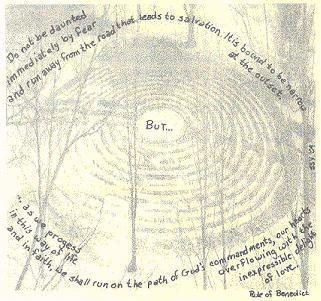Kathleen Norris on the Real Sins of Sex
Kathleen Norris is a poet, writer, and Benedictine oblate (author of The Cloister Walk, Amazing Grace, Dakota, etc.). I've just reached a point in reading The Virgin of Bennington where she's speaking about being at Bennington college in the 1960s, as the very sheltered rural girl now thrown into the city in New York, and how she ended up being the one to hear about all the various sexual exploits of her dormmates:
Although I could not have imagined this then, my years at Bennington did constitute a sort of priestly training. I had to learn to listen carefully, without rushing to judgement. The primary education, or formation, if you will, that I received in college had little to do with books and everything to do with mercy. I learned that sexual preferences and practices, no matter how depraved they might appear on the surface, were significant only insofar as they affected who a person became. Controlling and manipulative sex would replicate itself in controlling and manipulative behavior in the classroom or with one's friends. Watonness might be sheer desperation, masking a suicidal self-debasement, but it might also represent a joyful, lusty sexuality that indicated, at heart, a vast generosity of spirit. Sexual abstinence might be wise and thoughtful, or an embittering rage that fed on belittling others for their perceived sexual weakness. Even as my own sexual experience remained extremely limited, I gained a broad perspective on the range of human sexuality that has served me well.
I now recognize that having friends who indulged in sexual behavior that I found incomprehensible was a test of my spirit that would have been familiar to fourth-century Christian monks. They were uncannily wise about the strength of human sexual desires and blasé when fellow monks would succomb to temptation. The real scandal, to them, was in assuming that such behavior would cut a person off from God. Despair, loathing, and presuming to judge were far worse than any sexual misconduct: if the erring monk were to indulge in self-hatred to such a degree that he began to feel that his prayers for forgiveness were useless, or if other monks condemned and rejected him for his licentious behavior. The literature of early monasticism sometimes shocks with its absolute refusal to judge other people. It insists on the supreme value of being steadfast in loving others.








7 Comments:
I really appreciate the sentiment of this excerpt. Thanks for posting it.
agreed with bright. thanks for putting it up.
Wow! I'm a big fan of Norris, but it's been a while since I've read anything of hers. And I've yet to read this piece. That passage is powerful stuff.
'...the supreme value of being steadfast in loving others.'
I like that.
*deep in thought*
Thanks for the birthday wish.
thank you for this.
Post a Comment
<< Home